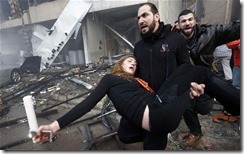 The recent bombings in Beirut elevates Lebanon to the ironic status of a democratic country, in the modern Western sense of the term. Sadly, this is no privilege at all, more of a burden really. As I argued earlier, Terrorism as a particular form of carrying out political action is only possible if certain democratic structures are part of society’s general culture. Terrorism targets the feelings of civilians because the latter can, through this particular human disposition, extract concessions from political elites.
The recent bombings in Beirut elevates Lebanon to the ironic status of a democratic country, in the modern Western sense of the term. Sadly, this is no privilege at all, more of a burden really. As I argued earlier, Terrorism as a particular form of carrying out political action is only possible if certain democratic structures are part of society’s general culture. Terrorism targets the feelings of civilians because the latter can, through this particular human disposition, extract concessions from political elites.
After 2005, most assassinations in Lebanon involve a mix of vendetta types of violence that target political actors and this “democratic” form of politics. Vendetta types of violence do not necessarily target the feelings or views of a specific group of people, only political actors. Terrorism though does and is peculiar to the modern age. There is no terrorism without some form of democratic politics as understood through liberal ideals of representations (such as individualism, freedom of choice, mass consumption economy, etc.) and the political setting of the Nation-State. Wherever there were terrorist attacks in the non-Western world, it is noticeable that they always involved a political message either to foreign countries (say attacking touristic sites, nightclubs), or local political regimes that are democratic in the sense that the “feelings” of their societies can have a direct bearing on the political process.
Yet even though nowhere before have we been faced with the immediacy of distant death, nowhere before have we been so distant to killings that are incurred by people who are trying to send a message to us. In effect, terrorism targeting civilians is not targeting the people who were actually killed but potentially any people that are part of a political delineated community (here the Shi’i community but also the Lebanese, and so on). Terrorism in this sense is one of these rare instances where violence is used on a person or group who is not the real target.
To come to the recent suicide explosion in Dahyeh, I’m not here analyzing the political message sent to the elite (Hizbullah’s political party, or whoever is incurring such attacks) or to the constituency of a political movement or organization. I’m more interested in what people actually do about it. Although people can be “terrorized” by what is happening they seem helpless as to what to do about it. Can they really force political actors to change their course of actions?
Then, Terrorism is doomed because on the one hand it assumes that the feelings that civilians have, fueled by media strategies, are going to influence political elites to do something about it, and on the other hand, it assumes that civilians feelings are in themselves a motive of political change. Raw emotions do not create interesting change at the political level. Only does reason. And it is reason that is the stuff from which political decisions are made.
This is why terrorism is a victim of the media effect, and democracies or ideals of democracies are experienced as a spectacle in today’s societies. In our modern political systems that are animated by the technological and media industry, “feelings” and “emotions” understood in a raw sense are the primary human traits that is meant to dictate political action. This is why terrorism exist. In the absence of such human predisposition, terrorism would not be a viable weapon.
Here lies one of the contradictions of the culture of democracies and how they are the source of their own misery. Democracies as they function today involve a politics of emotions that traditionally was never linked to politics as such. It does not mean that traditionally, feelings where not getting in the way of correct handling of political matter, far from it. War practices always involved forms of cruelties that surely were triggered by specific types of emotions and feelings and in turn triggered these types of feelings. But never, were feelings used in a way were curtailed by higher forms of politics that ordered the way agreements were reached, successions were arranged, or war were started.
